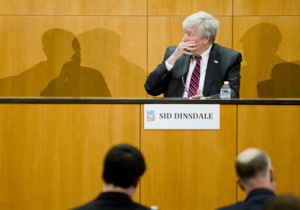Some bankers blamed Dinsdale for helping get Frank-Dodd passed

By Deena Winter | Nebraska Watchdog
LINCOLN, Neb. — Surging U.S. Senate candidate Sid Dinsdale has complained about the Frank-Dodd Act on the campaign trail, but three years ago a banking magazine laid some of the blame for its passage at his feet.
DEBATING DODD: During a Lincoln debate last month, Senate candidate Sid Dinsdale was critical of the Frank-Dodd Act, but has been blamed by some for helping get the financial reform legislation passed.
Dodd-Frank was a package of sweeping financial reforms passed in 2010 after the Great Recession to protect consumers and better regulate Wall Street to prevent the collapse of major companies like Lehman Brothers. It also created the Consumer Financial Protection Bureau to protect consumers from unscrupulous business practices by banks.
Dinsdale is president of Pinnacle Bankcorp; his family founded Pinnacle Bank, the third wealthiest bank in Nebraska. He’s locked in a four-way fight for the Republican nomination for the Senate in Tuesday’s primary election.
During debates and on the campaign trail, Dinsdale has talked a lot about reducing government interference and slowing down “this big government, centralized train” and criticized Dodd-Frank.
However, a lengthy, detailed 2010 story about Frank-Dodd by American Banker strongly suggests Dinsdale pressured then-Sen. Ben Nelson to change his vote to allow the Frank-Dodd bill to the floor for a vote.
Nelson denied that in an interview with Nebraska Watchdog on Tuesday.
The Senate held several votes to determine whether Frank-Dodd would move to the floor, but “the cloture motion was rejected three times, in large part because Sen. Ben Nelson of Nebraska voted against cloture,” the story said.
Then Nelson and two Republican senators from Maine switched sides, allowing the bill to proceed to the floor.
The article goes on to detail how the American Bankers Association blamed the Independent Community Bankers of America for getting Nelson to change his vote after hearing from a couple of Nebraska bankers — and Dinsdale was one of those named.
Although Dinsdale wasn’t quoted in the story, Mark Hesser, president of Pinnacle Bank, told the magazine he pushed provisions favorable to community banks in talks with Nelson.
“Personally as a banker… there was going to be legislation passed, you wanted to get the best passed that you could,” Hesser was quoted saying at the time.
He called the ABA’s opposition to Dodd-Frank “outrageous,” but he denied Pinnacle Bank was the reason Nelson changed his mind, telling the magazine, “Any senator had numerous considerations. America wanted Wall Street reform, which is why ABA’s position seemed that much more outrageous.”
A spokesman for Nelson told the magazine he changed his mind after talking to “Nebraska Main Street business owners, Nebraska bankers from large and small banks and many Nebraskans who wrote or called him about financial reform.”
Nelson, who after retiring from the Senate took a job as chief executive of the National Association of Insurance Commissioners, denied the banking magazine’s version of events. He said it was his decision, although that doesn’t mean he didn’t get input from people.
“I don’t remember that and I don’t believe there’s any truth to that,” he told Nebraska Watchdog. “I don’t recall any conversation, nor would any one person or group pressure me to do something like that.”
Although he knows Dinsdale “socially,” having been around banking his entire adult life, he said neither Dinsdale nor anyone else with Pinnacle Bank were the sole reason he changed his vote.
“We had lots of conversations with Nebraska bankers, community bankers and other bankers,” he said. “I made up my own mind.”
While Pinnacle Bank apparently lobbied for provisions that would be favorable to community banks rather than outright opposing the legislation, Dinsdale has been critical of the law on the campaign trail. During a debate in Lincoln last month, he said Frank-Dodd attempts to manage every risk point in financial services, noting a Brunswick banker who’s been forced to make unsecured loans because he can’t make residential loans, comparing it to “centralized planning.”
Nebraska Watchdog requested an interview with Dinsdale to talk about Pinnacle Bank’s support for the law in 2010 and his ties to it, but his spokesman, Michael Valentino, said he was unavailable until Monday because he’s campaigning across the state and has “spotty service.” (He did, however, manage to do a radio interview the following day on KLIN.)
Instead, Valentino released a statement from Dinsdale saying he’s running to stop “the overreach of the federal government,” of which Dodd-Frank is a perfect example.
“I have never been in support of Dodd-Frank,” he said. “When elected to the U.S. Senate, I will work to see that it is repealed because it hurts community banks, like my bank, that seek to help people in buying their first home and starting a small business.”
Asked about the American Banking story that links Dinsdale with Nelson’s change of mind, Valentino said, “Those allegations are completely untrue and have been refuted multiple times. Sid never spoke to Ben Nelson regarding Dodd-Frank. The ICBA provided amendments to the bill when it was clear that it was going to pass.”
Contact Deena Winter at deena@nebraskawatchdog.org. Follow Deena on Twitter at @DeenaNEWatchdog
Editor’s note: to subscribe to News Updates from Nebraska Watchdog at no cost, click here.







